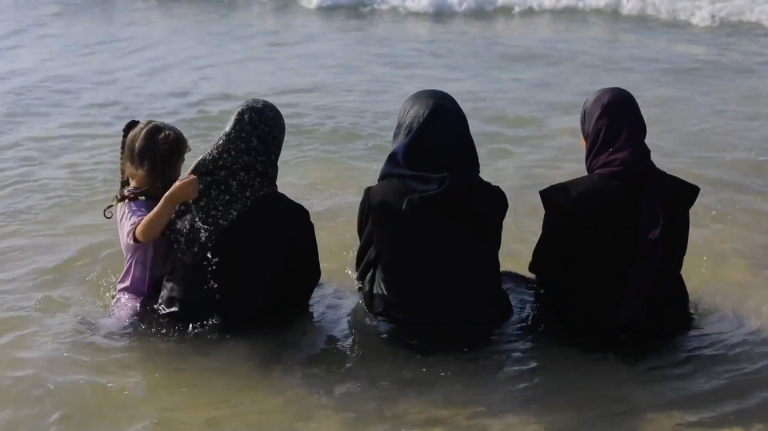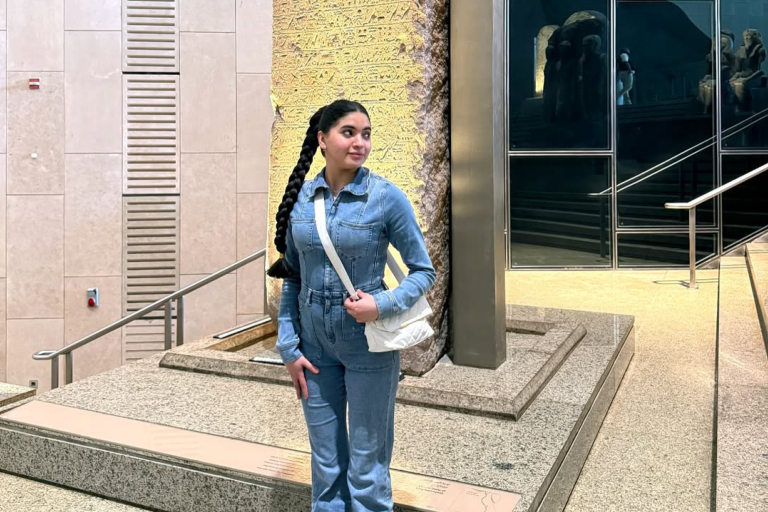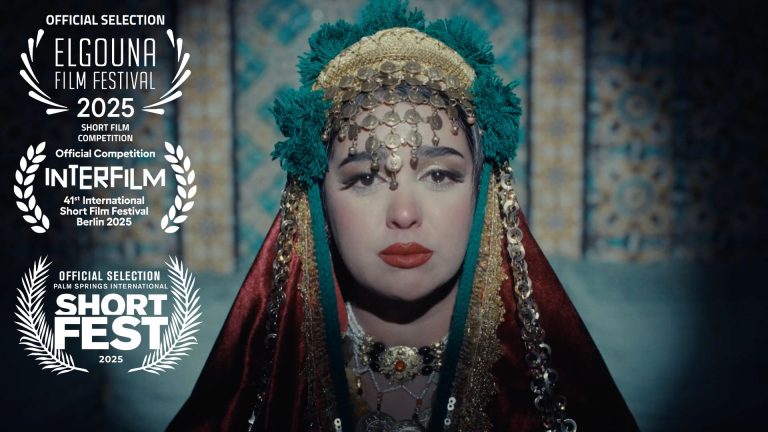When Sundus Abdul Hadi talks about founding Maktaba — the independent bookstore she co-founded in Montreal, Canada with her husband Yassin Alsalman — her intentions are clear.
“[It] was really to recreate that feeling of home for myself, and it seems that that resonates with a lot of people.” Maktaba, Arabic for “library” or “bookstore”, isn’t just a retail space: It’s an art project, born out of memory and imagination, part cultural archive and part refuge.
Inspired by the long tradition of Arab booksellers and the literary street of al-Mutanabbi in Baghdad, it’s a place where the forward-facing display of titles that span categories like Indigenous Futurisms, Ancestral Knowledge, and Self and Community Care invite customers in.
The shop also features a majlis, or sitting room, where visitors are asked to remove their shoes to emulate the feeling of stepping into someone’s home.
“It disarms you a little bit, it grounds you and brings you closer to this feeling of safety,” Abdul Hadi says.
As an Iraqi immigrant living in Montreal for three decades, the idea of planting roots in Canada felt uneasy, heavy with the weight of colonial legacies, displacement and diasporic longing.
“I always struggled with setting down roots in a place that I felt wasn’t really my home,” she reflects. But, she shares, opening Maktaba changed that feeling.
The bookshop’s location also coincidentally has Canadian historical significance, taking up space in a 200-year-old heritage building in Montreal’s Old Port neighborhood.
Across the street is Montreal’s first public square, where The Great Peace treaty was signed between the French Settlers and 39 Indigenous First Nations Tribes. Canada’s colonial history runs deep in the cobblestone streets, so the importance of dedicating the shop to deconstructing colonial thought is not lost on its founders.
“There was no blueprint or space like Maktaba. It all starts from my own personal lived experience, and then it extends outwards,” Abdul Hadi explains.

Born from the pain and isolation of the pandemic, the three-year-old bookshop and community space is a direct reflection of its founder.
The titles are carefully selected by Abdul Hadi. A self-proclaimed avid reader, Abdul Hadi describes the shop as an extension to her personal library, a “copy-paste” of what she’s reading, the titles she would lend to a friend.
“I love the medium of a book. I feel like it’s an important and ancient and timeless form of art and communication and knowledge. It just has so much to give.”
Throughout the conversation, Abdul Hadi falters only once,when asked if she has a favorite book. “I can give you a favorite in every category but a favorite book is almost impossible.”
Abdul Hadi and her husband are both practicing artists. During the pandemic, Abdul Hadi wrote Take Care of Your Self: The Art and Cultures of Care and Liberation, which deconstructs the capitalist notions of self care and replaces them with collective practices rooted in the struggles of the oppressed.
She credits the writing of this book to the opening of Maktaba, saying it planted the intention of wanting to decolonize spaces of art and culture.
Her husband Yassin Alsalman, more commonly known as NARCY, is a rapper and founder of We Are The Medium, a creative house and production hub dedicated to “decentralizing business from the arts.”
It’s Alsalman who handles most of the cultural programming in the shop, curating community events, supporting artists in residence and producing work with We Are The Medium to support the project and uplift artists with the same mindset and intentionality.
“When we were in our twenties, we didn’t have a place where we could go and somebody would ask us, what do we need as artists,” Alsalman says of the objective of his community programming.
“One of my quiet mandates of doing programming is, how do I break the hierarchy in the artistic process and in industry within our space,” Alsalman shares.
To him, this means sharing and promoting artists that align with their values, no matter their status or following size. Maktaba’s Instagram is a who’s-who of relevant Arabs in the diaspora and non-Arabs who support inclusive and culturally diverse arts and music.
Posts feature big names like Elyanna and fellow Canadian Nemahsis, as well as smaller influential voices like Thanks Joey and Nadine el Roubi, the latter having just finished her artist residency in the hub.
“My residency with Maktaba was a transformative and healing experience,” El Roubi says of her two weeks on site. “It felt like unlearning years of generational trauma and seeing what a life created with love, care, and a reverence for pure creativity can look like.”
El Roubi also notes the context in which the Maktaba community came together.
“We live in times wrought with betrayal, a dishonoring of culture and what it means to be an Arab, where all we have is the passing down of knowledge and the things we create. Maktaba is a space that offers both of these things, a space for like-minded individuals with a shared purpose.”

Alsalman shares the importance of Maktaba’s programming while referencing the highly turbulent and violent backdrop he and Abdul Hadi endured as Arabs living in the West.
He remarks on the invasion of Iraq in 2003 a pivotal moment for an entire generation.
He mentions the Quebec City Mosque shooting, an Islamophobic attack in 2017 that claimed the lives of six men while performing prayer.
The community space also hosts mediation circles, creating space for the processing of the grief normally unspoken and unrecognized.
“They’ve been at war with us since 2001, so it’s nothing new for us to be proactive and in designing the world that we want to see around our culture,” Alsalman says.
“We were fighting the monster of Islamophobia and anti-Arab rhetoric, which is back now. So in a way Maktaba ended up serving this purpose for a younger generation that we lacked,” he adds.
What makes Maktaba’s programming special is its ability to tap into the needs of the community at any given time.
Alsalman references October 2023, when the bombardment of the Gaza Strip and the beginning of what the United Nations has condemned as a genocide, began to unfold. This highlighted how the bookshop mobilized the community to raise funds and donated all proceeds from its Palestine section—restocking titles multiple times as they continually sold out.
When the students at McGill University answered the global call for resistance and launched a local student encampment, Abdul Hadi and Alsalman donated books to their library, dubbed the Laila Khaled Liberation Library by the students.
“Our Palestine section didn’t begin on October 7th, we always had it,” Abdul Hadi notes.
It was Maktaba’s Palestine section that put a spotlight on the small shop, a much needed resource at a time when it felt as if a global awakening was happening.
With nearly 16 thousand followers on Instagram and international shipping, it’s hard to remember the shop is a three-person operation; Abdul Hadi and Alsalman plus their store manager, Darine.
But the shop’s message has taken off, with visitors coming from and ordering to international locations.
Despite this, Abdul Hadi and Alsalman have no plans to expand to shops outside of Montreal.
“I measure the success of the project by the fact that we’re both happy doing it,” Alsalman says. “It’s such a privilege to be able to be completely independent, to have the support of the community to keep the space sustainable,” Abdul Hadi adds.














